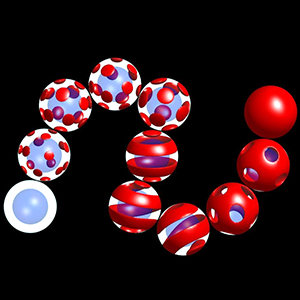
The Shell group is developing fundamental approaches to coarse-grained models and to linking simulations across length and time scales. Their unique information-theoretic approach is able to quantify information loss upon coarse-graining in such a way that permits systematic generation of optimal coarse models. They continue to expand this general theoretical framework and are developing robust simulation methods and algorithms to enable large-scale yet physically accurate coarse-grained models of complex molecular systems.
A collaboration between the Leal and Shell groups is also developing multiscale strategies for coupling the continuum transport equations with mesoscale and molecular simulations of fluid flow. These methods are being used to investigate transport problems in which both molecular and macroscopic length and time scales play an important role, for example, when molecular resolution is needed at an interface to capture complex phenomena or provide an appropriate hydrodynamic boundary condition.
The Fredrickson group has translated force-matching techniques from particle-based simulations to affect systematic coarse-graining of polymer field theories. The methodology has a close relationship to renormalization group theory and when fully optimized will enable seamless simulations across length scales ranging from a few nanometers to microns and beyond. Another effort in the group involves the development of strategies for mapping complex-valued (D+1)-dimensional field theories to real-valued D-dimensional field theories with significantly reduced computational complexity.
The Peters group has made foundational advances in the development of rigorous but practical strategies for investigating long time-scale events through powerful rare events methods.



